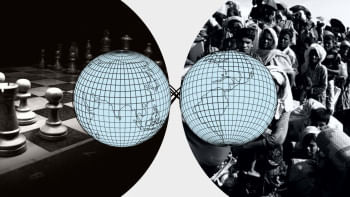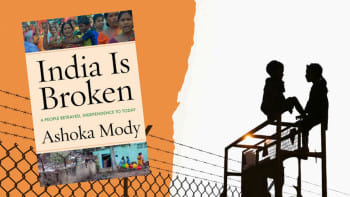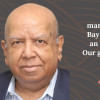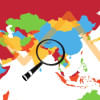A new frontier for regional cooperation

Indo-Pacific is the flavour of the season. With the emergence of the Quadrilateral Security Dialogue (Quad) as an important regional mini-lateral platform, this confluence of two mighty oceans connected by the Straits of Malacca has become the most happening region in the world in the 21st century.
Although in news largely due to the evolving great power competition in the Indo-Pacific, Indian Ocean has its distinct identity and importance. From the Persian Gulf to the Straits of Malacca, this third largest water body on earth is home to over 38 countries that house two billion people. Four of the top 10 most populous democracies are situated in the region.
This region became notorious in the past for rivalries in South Asia, conflicts in West Asia, religious extremism, piracy, and above all, the growing competition between India and China. It emerged as home for intense military competition among some of the powerful navies in the world too. While the US traditionally has strong naval presence from Bahrain to Diego Garcia, China increased its naval strength and activity in recent years by building a number of ports, euphemistically called "the String of Pearls". India and France too have multiple bases in the region. In the last decade, India's naval presence has increased significantly through building maritime muscle and engaging in joint exercises with several nations including the US, Australia and Japan.
However, as the decades passed, the geo-economic, rather than geo-strategic significance of the region started dawning on the world. Over 80 percent of the world's oil trade happens through this great ocean region, while over 70 percent of the container trade passes through it.
India, the largest country in the region that covers almost 40 percent of its waters and 70 percent of its population, is central to the geopolitics of the Indian Ocean region. Its dependence on the Indian Ocean region is massive with almost 100 percent of its oil imports and 70 percent other trade happening through it. Besides, India has, over decades, developed major economic and strategic interests in the region including in mining, agriculture, marine economy and oil exploration. It is engaged in a port building spree from Iran to Mauritius to Myanmar to Bangladesh.
The region enjoys another distinct feature, i.e., the strong civilisational and cultural connect. Most countries in the region, from Indonesia to Iran, and from East Africa to Asean, share historic civilisational bonds that are cherished to this day.
Prime Minister Narendra Modi of India provided dynamic leadership to this region through multiple initiatives including forging strong bilateral ties with all the important neighbours and announcing the SAGAR – Security and Growth for All in the Region initiative. The BIMSTEC – covering countries in the Bay of Bengal region, is another important initiative that India took in building strong partnerships.
From the Persian Gulf to the Straits of Malacca, this third largest water body on earth is home to over 38 countries that house two billion people.
In the BIMSTEC neighbourhood, Bangladesh, the youngest nation in the region, is an important partner for India. Although it remained an underdog in the initial decades of independence due to internal strife, the country has bounced back in the last two decades to emerge as a regional powerhouse today.
Under the bold and visionary leadership of Prime Minister Sheikh Hasina, Bangladesh has today grown into a regional economic power. One of the most youthful nations in the world, Bangladesh today boasts of the second highest per capita GDP in South Asia, surpassing even India.
Although a reticent nation in its neighbourhood, Bangladesh has never shirked away from its international obligations. The United Nations acknowledges that Bangladesh is the "second biggest contributor of military and police to UN Peacekeeping".
India recognises the potential of Bangladesh in playing a proactive role in the Indian Ocean region, since peace and stability in the region are vital to peace, progress and prosperity of 160 million Bangladeshis as well as 1.4 billion Indians. India earnestly wishes that time has come for Bangladesh as a major regional power to join forces with India for building a peaceful, stable, prosperous and inclusive Indian Ocean region, a lifeline for the two countries.
The Sixth Indian Ocean Conference that is being hosted in Dhaka on May 12-13 is bound to bring Bangladesh to the frontlines of the regional leadership that it richly deserves. Prime Minister Sheikh Hasina, who will be the chief guest at the inauguration of the conference in the august company of the president of Mauritius, vice president of Maldives, and foreign ministers from over 20 countries including India, is the centre of attraction for the conference this year. Praised by many as the iron lady of South Asia with a record of crushing terrorism and insurgency and transforming Bangladesh into one of the peaceful developing nations in the South Asian neighbourhood, Sheikh Hasina is poised to embark on a new journey of leadership in the Indian Ocean region.
Indian Ocean Conference, hosted by the Delhi-based India Foundation, in association with the Ministry of External Affairs, Government of India and Ministry of Foreign Affairs, Government of Bangladesh, is not any regional club or alliance. Led by the presidium of foreign ministers of India, Bangladesh, Singapore and Oman, it is a forum that brings together leaders "from the region" with the mission of making them leaders "of the region".
There cannot be a better way of paying tribute to the Father of the Nation, Bangabandhu Sheikh Mujibur Rahman, who declared that his country shall strive for "friendship with all, malice towards none", than to host this evolving "Parliament of Indian Ocean Leaders".
Ram Madhav is president of India Foundation and former General Secretary of the Bharatiya Janata Party.

 For all latest news, follow The Daily Star's Google News channel.
For all latest news, follow The Daily Star's Google News channel. 








Comments